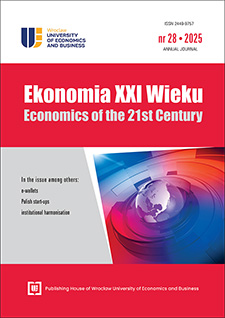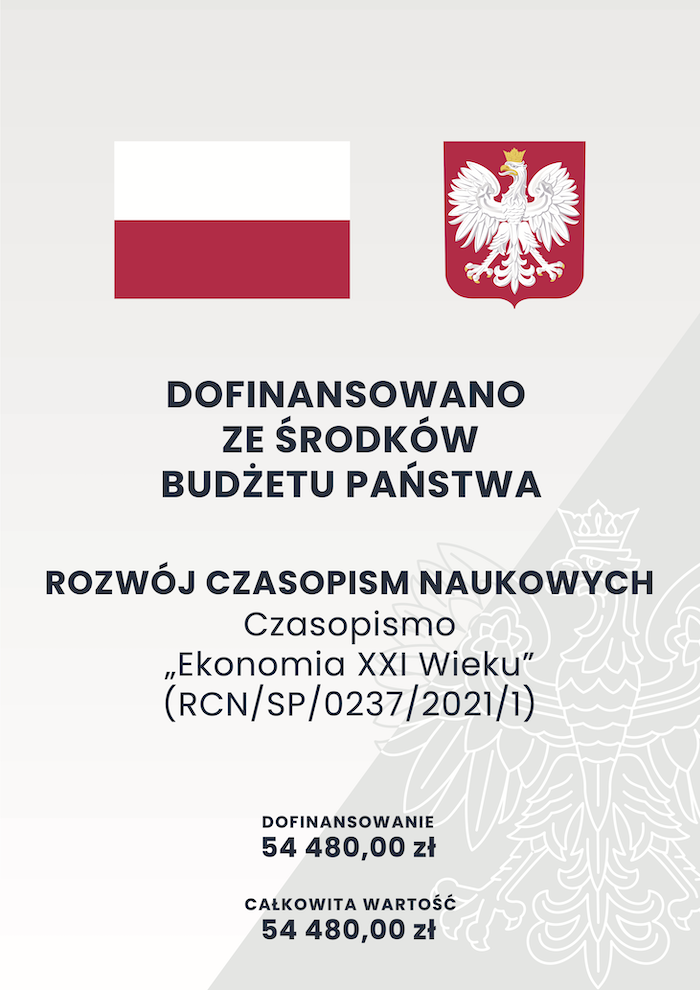The Feminine Dimension of Digital Nomadism: A Qualitative Analysis of Nomadic Women's Experiences
DOI:
https://doi.org/10.15611/e21.2025.05Keywords:
digital nomadism, digital nomads, place marketingAbstract
Aim: The article aims to present the advantages and disadvantages of the digital nomad lifestyle from a female perspective. The theoretical part also includes the definition of digital nomadism as a global trend and the benefits of acquiring one of the newest target groups of territorial units. The research conclusions focus on territorial marketing, specifically supporting managers in creating appropriate destinations for female mobile workers.
Methodology: A qualitative approach was used with a structured interview questionnaire. The research involved 12 women who, at the time of the study, were actively leading a nomadic lifestyle in different parts of the world.
Results: The most frequently mentioned advantages of a nomadic lifestyle included freedom and mobility. The women appreciate the sense of autonomy in deciding when and where to work. Regarding the most frequently mentioned disadvantages, the participants mentioned feeling lonely and having difficulties maintaining relationships when frequently changing places of residence.
Implications and recommendations: The research allows for a better understanding of challenges and needs facing women related to their mobile lifestyle. The conclusions from the research are addressed to the authorities of territorial units. The implications are related to place marketing and can support the attraction of digital nomads to destinations.
Originality/value: The study's value can be attested by the fact that so far only two scientific articles have drawn attention to the female perspective of digital nomadism so far. According to statistics, more women are deciding to fulfill their professional duties in this mode. Given the growing share of women among digital nomads, the research findings shed light on better adapting destinations to their stay.
Downloads
References
Almeida, M. A., de, Correia, A., Schneider, D., & Souza, J. M., de. (2021, May 5-7). COVID-19 as an Opportunity to Test a Digital Nomad Lifestyle. In 2021 IEEE 24th International Conference on Computer Supported Cooperative Work in Design (CSCWD) (pp. 1209-1214).
Basaran, A. (2025). Digital Nomads, the New Frontier of Work in the Digital Age: A Bibliometric Analysis. Sustainability, 17(5), 1906.
Basu, M. (2024). Tech-driven Horizons: Pioneering Sustainable Tourism for Environmental Resilience and SDGs Triumph. In P. Singh, S. Daga, K. Yadav, & A. Jain (Eds.), The Need for Sustainable Tourism in an Era of Global Climate Change: Pathway to a Greener Future (pp. 215-247). Emerald Group Publishing.
Beaumont, J. (2019). Digital Nomads and Sense of Place: A Case Study of Lisbon. Wageningen University.
Bednorz, J. (2024). Working from Anywhere? Work from Here! Approaches to Attract Digital Nomads. Annals of Tourism Research, 105, 103715.
Boddy, C. R. (2016). Sample Size for Qualitative Research. Qualitative Market Research: An International Journal, 19(4), 426-432.
Bonneau, C., & Aroles, J. (2021). Digital Nomads: A New Form of Leisure Class? In J. Aroles, F.-X. de Vaujany, & K. Dale (Eds.), Experiencing the New World of Work (pp. 157-177). Cambridge University Press.
Bozzi, A. (2024). Digital Nomadism from the Perspective of Places and Mobilities: A Literature Review. European Transport Research Review, 16(1), 11-15.
Chen, L. (2025). Gender Dynamics in Remote Work Communities: A Protocol on Understanding the Challenges and Opportunities for Female Digital Nomad Online Language Tutors. International Journal of Qualitative Methods, 24.
Chevtaeva, E. (2021). Coworking and Coliving: The Attraction for Digital Nomad Tourists. In W. Wörndl, C. Koo, & J. L. Stienmetz (Eds.), Information and Communication Technologies in Tourism. Proceedings of the ENTER 2021 eTourism Conference, January 19-22, 2021 (pp. 202-209). Springer.
Erkic, A. (2025). Digital Nomad Statistics for 2025. Pumble. Retrieved 12 June 2025 from https://pumble.com/learn/digital-nomad-visa/statistics/
Genceli, D. Y., Yüksek, G., & Uca, S. (2024). Travel Insurance Behaviors of Digital Nomads. Worldwide Hospitality and Tourism Themes, 16(3), 365-374.
Glinka, B., & Czakon, W. (2021). Podstawy badań jakościowych. Polskie Wydawnictwo Ekonomiczne.
Green, P. (2020). Disruptions of Self, Place and Mobility: Digital Nomads in Chiang Mai, Thailand. Mobilities, 15(3), 431-445.
Günay, F., Toksöz, D., & Aslan, Z. (2024). The Causes, Process and Result of Becoming a Digital Nomad Family: A Phenomenological Case Study. Worldwide Hospitality and Tourism Themes, 16(3), 294-302.
Johnson, C. (2024). Digital Nomads Move from Niche to Normal with 18.1M Workers. Staffing Industry Analysts. Retrieved 12 June 2025 from https://www.staffingindustry.com/news/global-daily-news/digital-nomads-move-from-niche-to-normal-with-181m-workers
Kvale, S. (2010). Prowadzenie wywiadów. Wydawnictwo Naukowe PWN.
Lacárcel, S., Huete, R., & Zerva, K. (2024). Decoding Digital Nomad Destination Decisions through User-generated Content. Technological Forecasting and Social Change, 200, 123098.
Lhakard, P. (2022). Destination City for Digital Nomads in Thailand: A Case Study of the Digital Nomad Community in Chiang Mai. Journal of Humanities and Social Sciences Studies, 4(1), 178188.
Liegl, M. (2014). Nomadicity and the Care of Place – On the Aesthetic and Affective Organization of Space in Freelance Creative Work. Computer Supported Cooperative Work, 23(2), 163-183.
Linao, P. A. (2022). The Rise of the Asian Female Digital Nomad. Master’s thesis, The Arctic University of Norway, Department of Tourism and Northern Studies, Campus Alta.
Loryn, B., de. (2023). An Exploration of the Digital Nomad Lifestyle in Pandemic Times. PhD Thesis, James Cook University.
Luo, Y., & Chan, R. (2020). Production of Coworking Spaces: Evidence from Shenzhen, China. Geoforum, 110, 97-105.
Mladenović, D. (2016). Concept of “Figure of Merit” for Place Marketing in the Digital Nomadism Age. In D. Petranová, J. Matš, & D. Mendelová (Eds.), Marketing Identity Conference 2016 (pp. 393-403). Fakulta Masmediálnej Komunikácie.
Nikolaiets, K., Umantsiv, Y., Shtunder, I., Ozhelevskaya, T., & Shcherbakova, T. (2023). Virtual Labor Migration: Current Trends and Development Prospects. Financial and Credit Activity: Problems of Theory and Practice, 5(52), 471-480.
Özoğul Balyali, T. (2024). Female Digital Nomads’ Destination Experiencescape Perspective. Worldwide Hospitality and Tourism Themes, 16(3), 282-293.
Poulaki, I., Mavragani, E., Kaziani, A., & Chatzimichali, E. (2023). Digital Nomads: Advances in Hospitality and Destination Attractiveness. Tourism and Hospitality, 4(3), 483-498.
Poulaki, I., Vlassi, E., Mavragani, E., Chatzimichali, E., & Papatheodorou, A. (2025). Destination Buzzers: Netnographying Digital Nomads. Tourism and Hospitality, 6(2), 81.
Reichenberger, I. (2017). Digital Nomads: A Quest for Holistic Freedom in Work and Leisure. Annals of Leisure Research, 21(3), 364-380.
Šmite, D., Moe, N. B., Klotins, E., & Gonzalez-Huerta, J. (2023). From Forced Working-from-Home to Voluntary Working-from-Anywhere: Two Revolutions in Telework. Journal of Systems and Software, 195, 111509.
Svobodová, D. (2022). Digital Nomadism – Implemented Policies. In 22nd International Joint Conference Central and Eastern Europe in the Changing Business Environment: Proceedings (pp. 89-97). Oeconomica Publishing House.
Sztuk, A. (2023). Cities’ Attractiveness Factors from the Perspective of Digital Nomads. Scientific Papers of Silesian University of Technology Organization and Management Series, (174), 323-336.
Sztuk, A. (2025). Key Research Areas in Territorial Marketing from 2020 to 2025. Research Papers of Wroclaw University of Economics and Business, 69(1), 109-117.
Tagliaferri, C. (2023). 45+ Exciting Statistics about Digital Nomads in 2023. Think Remote. Retrieved 11 June 2025 from https://thinkremote.com/digital-nomad-statistics/
Thompson, B. Y. (2019). The Digital Nomad Lifestyle: (Remote) Work/Leisure Balance, Privilege, and Constructed Community. International Journal of the Sociology of Leisure, 2, 27-42.
Wang, B., Schlagwein, D., Cecez-Kecmanovic, D., & Cahalane, M. (2018). Digital Work and High-tech Wanderers: Three Theoretical Framings and a Research Agenda for Digital Nomadism. In Australasian Conference on Information Systems 2018. UTS ePRESS.
Zerva, K., Huete, R., & Segovia-Pérez, M. (2023). Digital Nomad Tourism: The Experience of Living at the Destination. In International Conference on Modern Trends in Business Hospitality and Tourism (pp. 15-26). Springer.






